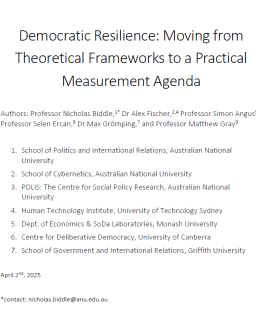
Abstract
This paper examines democracy as a resilient system, emphasizing the role of applied analysis in shaping effective policy and programs, particularly in Australia. Grounded in adaptive processes, democratic resilience is the capacity of a democracy to identify problems, and collectively respond to changing conditions, balancing institutional stability with transformative. It outlines the ambition of a national network of scholars, civil society leaders, and policymakers to equip democratic innovators with practical insights and foresight underpinning new ideas. These insights are essential for strengthening both public institutions, public narratives and community programs. This article presents a practical research agenda connecting a national network of scholars and civil society leaders. We suggest this agenda be problem-driven, facilitated by participatory approaches to asking and prioritising the questions that matter most. We propose a connected approach to collectively posing key questions that matter most, expanding data sources, and fostering applied ideation between communities, civil society, government, and academia— ensuring democracy remains resilient in an evolving global and national context.
File attachments
| Attachment | Size |
|---|---|
| Resilient-Democracy---Discussion-Paper-05---Biddle-et-al.---Final.pdf(1.3 MB) | 1.3 MB |